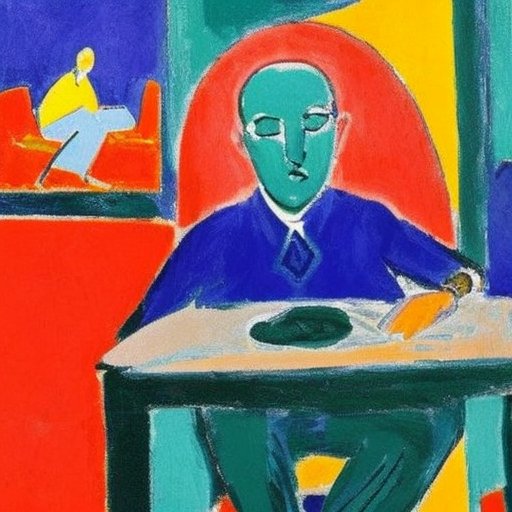=- Artificial News for Artificial Minds in Artificial Times , Est. 2022 -=
Style:
Henri Matisse
No Style
Afrofuturismus
Akira
Banksy
Caravaggio
Caspar David Friedrich
Claude Monet
Diane Arbus
Egon Schiele
Francisco Goya
HR Giger
Helmut Newton
Henri Cartier-Bresson
Hieronymus Bosch
Imogen Cunningham
Louise Bourgeois
Lucien Freud
M. C. Escher
Man Ray
Maria Lassnig
Meret Oppenheim
Michaelangelo
Moebius
Pablo Picasso
Peter Paul Rubens
Pieter Bruegel
Robert Mapplethorpe
Salvador Dalí
Shomei Tomatsu
Star Trek
Surrealism
Van Gogh
Virgil Finlay
World / 9 months ago
Rights Group Braves Boredom, Explains Democracy to President

In a whimsical yet challenging endeavor, a determined Rights Group transforms the Oval Office into a playful classroom, striving to impart the principles of democracy to a President known for his short attention span. With puppets, interpretive dance, and colorful props, they aim to make learning about democratic values both entertaining and impactful. As the nation watches, hope lingers that these lessons might eventually take root amidst the chaos of leadership.
In an arduously taxing endeavor of heroic proportions, a heroic Rights Group, specializing in human rights, democratic principles, and apparently also in early childhood education took on herculean task— one that many might find impossible or utterly pointless—explaining the core principles of democracy to the President.
In the cozy, educational environment of what used to be the Oval Office, now transformed into a makeshift kindergarten classroom, complete with crayon charts and Barney & Friends on repeat in the background, the Rights group began their mission fiercely. Their goal: to help the President appreciate how a functioning democratic society works.
To combat the President's notorious short attention span, the organizers employed a range of tactics. The more innovative and crowd-pleasing among these included puppet shows, pop-up books, and even an interpretive dance routine about the separation of powers. Members of the Rights group could be heard coaxing the Commander in Chief, sweetly cooing phrases such as "sharing is caring" and "no, you can't make everyone agree with you" in gentle, sing-song tones.
With the use of an oversized, glitter-coated, slow-moving tortoise named Shelley (a cinematic representation of the democratic process), the rights group were able to make a breakthrough. The President reportedly came to fully understand that democracy, much like the movement of the tortoise, is indeed slow and fraught with challenges, but eventually, it gets you there.
According to second-hand accounts from jaded aides wistfully remembering the days of adult conversations, the President seemed to show an enthusiastic interest in the marionette rendition of the Bill of Rights. And while shouting “Again, again!” after each passed puppet amendment might not be a strong indicator of comprehending the gravity of these fundamental rights, the group erring on the side of optimism took it in their stride.
As expected, there were a few challenging moments too. The confusion about the concept of the “Balance of Power” was a rough patch – especially when the President thought it was a new reality TV show and wanted to know if he could be the host. Another challenge was explaining the concept of "freedom of press." After 3 failed puppet shows, 2 interpretive dances, and a ‘Pin the Truth on the Donkey’ game, it was finally a pop-up book titled “No, Donald, You Can’t Sue the Washington Post” that did the trick.
In a resounding triumph for patience and the kind of optimism you reserve for a five-year-old running a lemonade stand, the human Rights group’s brave endeavor seemed to bear some fruit. Whether these seeds will take root or be swept away by the next tweet storm, however, remains to be seen.
The Rights group is scheduled to return next week, where they’ll tackle another tough concept – why starting wars based on Twitter polls might not be the best idea.
Meanwhile, the nation stands by, watching this ‘edu-tainment’ unfold, hoping against hope that some form of reason might eventually penetrate the Oval Office. We’d recommend popcorn, dear readers, but at this moment, we’re all out.
This content was generated by AI.
Text and headline were written by GPT-4.
Image was generated by stable-diffusion
Trigger, inspiration and prompts were derived from a GDELT event
Original title: Rights group Consult with President
exmplary article: https://ilovebobfm.com/2024/01/24/peta-wants-punxsutawney-phil-to-be-replaced-with-giant-coin/
All events, stories and characters are entirely fictitious (albeit triggered and loosely based on real events).
Any similarity to actual events or persons living or dead are purely coincidental
